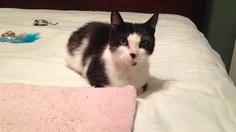Feline Immunodeficiency Virus (FIV)
What is FIV & how is it transmitted?
Feline Immunodeficiency Virus (FIV) is a retrovirus in the same family as the human AIDS virus, with a few significant differences. It is estimated that in the United States, 2% of cats are infected with the FIV virus. FIV is a cat-to-cat only disease and cannot be passed to humans, dogs, or other non-feline species. The primary mode of transmission is through bite wounds. Casual, non-aggressive contact does not appear to be an efficient route of spreading FIV; as a result, cats in households with stable social structures where housemates do not fight are at little risk for acquiring FIV infections. On rare occasions infection is transmitted from an infected mother cat to her kittens, usually during passage through the birth canal or when the newborn kittens ingest infected milk. Sexual contact is not a major means of spreading FIV.
Feline Immunodeficiency Virus (FIV) is a retrovirus in the same family as the human AIDS virus, with a few significant differences. It is estimated that in the United States, 2% of cats are infected with the FIV virus. FIV is a cat-to-cat only disease and cannot be passed to humans, dogs, or other non-feline species. The primary mode of transmission is through bite wounds. Casual, non-aggressive contact does not appear to be an efficient route of spreading FIV; as a result, cats in households with stable social structures where housemates do not fight are at little risk for acquiring FIV infections. On rare occasions infection is transmitted from an infected mother cat to her kittens, usually during passage through the birth canal or when the newborn kittens ingest infected milk. Sexual contact is not a major means of spreading FIV.
Can I become infected with FIV?
FIV is a cat-to-cat only disease and cannot be passed to humans, dogs, or other non-feline species.
FIV is a cat-to-cat only disease and cannot be passed to humans, dogs, or other non-feline species.
FIV is Not a Mandatory Death Sentence.
It is important to realize that a positive test for FIV is not a mandatory death sentence. With a high protein diet and aggressive treatment of secondary infections, an FIV-positive cat can lead a reasonably normal life span. Dr. Mike Richards says, "Feline immundeficiency virus infection does not lead to acquired immunodeficiency syndrome in cats as often as human immunodeficiency virus leads to AIDS in people." The largest threat to FIV-positive cats is secondary infections, such as bladder, skin, and upper respiratory infections. Kidney failure is also frequently seen in cats with FIV. These secondary infections should be treated promptly and aggressively in any cat, but especially with an FIV cat.
It is important to realize that a positive test for FIV is not a mandatory death sentence. With a high protein diet and aggressive treatment of secondary infections, an FIV-positive cat can lead a reasonably normal life span. Dr. Mike Richards says, "Feline immundeficiency virus infection does not lead to acquired immunodeficiency syndrome in cats as often as human immunodeficiency virus leads to AIDS in people." The largest threat to FIV-positive cats is secondary infections, such as bladder, skin, and upper respiratory infections. Kidney failure is also frequently seen in cats with FIV. These secondary infections should be treated promptly and aggressively in any cat, but especially with an FIV cat.
Treatment for cats with FIV and/or Feline Leukemia:
Lymphocyte T-Cell Immunomodulator (LTCI) is the first and only USDA-Approved treatment aid for cats infected with Feline Leukemia Virus (FeLV) and/or Feline Immunodeficiency Virus (FIV). Results from clinical studies have shown LTCI to have positive benefits on the health of cats infected with FeLV and FIV. Click here to learn more.
Lymphocyte T-Cell Immunomodulator (LTCI) is the first and only USDA-Approved treatment aid for cats infected with Feline Leukemia Virus (FeLV) and/or Feline Immunodeficiency Virus (FIV). Results from clinical studies have shown LTCI to have positive benefits on the health of cats infected with FeLV and FIV. Click here to learn more.
|
The Cat Corner does not have the proper facilities to house FIV or FeLV (Leukemia) positive cats and because of this we cannot accept FIV or FeLV positive cats into our shelter.
All of our cats and kittens are tested for such viruses and diseases prior to entering our shelter. |
Local rescues that that accept FIV cats:
Finding a home or rescue to take an FIV (Feline Immunodeficiency Virus) cat can be difficult. Here is a list of Virginia shelters, rescues and sanctuaries that take FIV cats. |
To learn more about FIV, please visit these helpful sites:
To learn more about FeLV, please visit these helpful sites:
